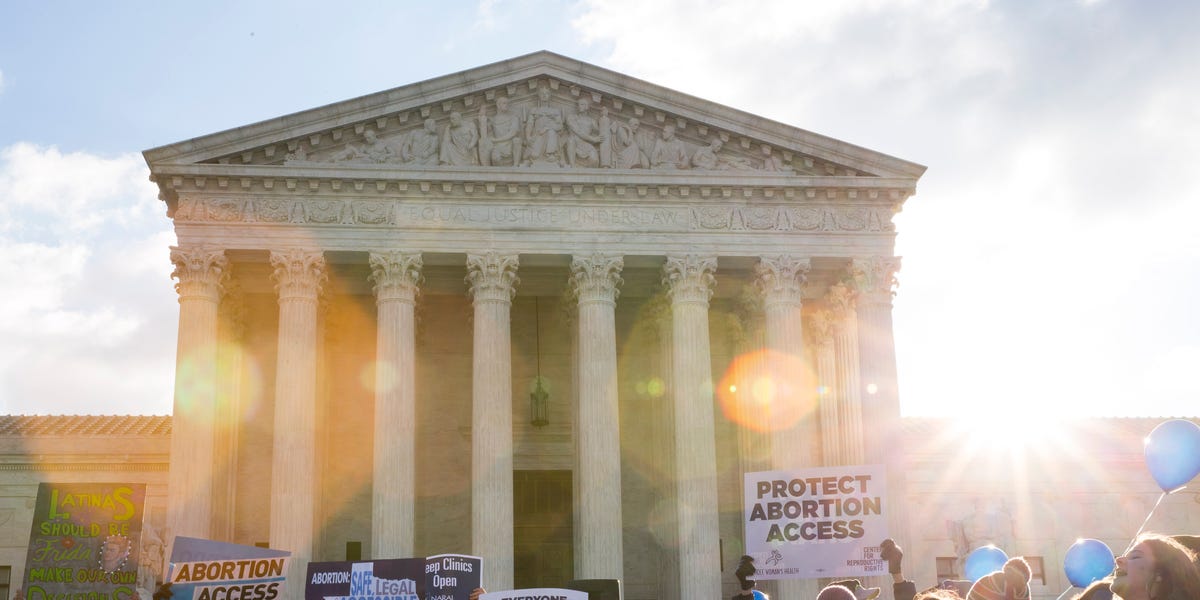

I have a bound copy of one of Justice Anthony Kennedy’s most famous opinions, Obergefell v. Hodges, which guaranteed same-sex couples the right to marry in 2015. It’s orange and white, and the width of a small notebook. As someone just coming to terms with her sexuality, his majority opinion brought me to tears when it was announced. So much felt possible as he authored the Obergefell decision. Who knew Kennedy, a Reagan appointee, was a man you could depend on?
Advertisement – Continue Reading Below
In 2016, you again felt the power a swing vote can have when, in Whole Woman’s Health v. Hellerstedt, Kennedy voted alongside four other justices to make it illegal for states to create abortion restrictions that place an “undue burden” on the women seeking them.
It’s easy to cling to people who came through at the right time, and despite his conservative leanings, Kennedy was occasionally one of them. But we should not feel obligated to beg for scraps of legal support for reproductive freedom, and with Kennedy, this is what we had to do. His particular brand of judicial conservatism left us never quite knowing how cases concerning reproductive freedom would shake out.
Kennedy upheld Roe in two landmark cases.
Advertisement – Continue Reading Below
One of the most consequential abortion rights cases after 1973 was 1992’s Planned Parenthood v. Casey, which tackled whether a state can require a waiting period (this time was 24 hours), notify the husbands of married women, and get parental consent for minors, all without violating Roe. In a twist, Kennedy authored the court’s opinion with Justices Sandra Day O’Connor and David Souter. It was a 5-4 decision, in favor of Planned Parenthood. The New York Times reported at the time that it was the “only case in which Justice Kennedy had found an abortion restriction unconstitutional in his 28 years on the Supreme Court.”
But Casey, while fundamentally upholding Roe, also introduced a “new legal standard” that granted states greater say over how to regulate abortion, as ProPublica’s Nina Martin explained. In Casey, the court diverted from Roe’s rules of trimesters and began to use a pregnancy’s “viability” as the measuring stick for access to the procedure, and we’re still feeling the effects of this decision today. (Reader, you probably live in a state where lawmakers have taken advantage of this decision and passed laws that further limit access to safe abortion.)
Advertisement – Continue Reading Below
Advertisement – Continue Reading Below
But that doesn’t mean he was entirely pro-choice.
Despite the surprise of his Casey opinion, Kennedy’s vote did not always swing toward pro-choice judicial decisions. In 2006’s Gonzales v Cardhart, he voted to uphold George W. Bush’s Partial Birth Abortion Ban. In an incredibly condescending opinion, Kennedy wrote, “Respect for human life finds an ultimate expression in the bond of love the mother has for her child. The Act recognizes this reality as well. Whether to have an abortion requires a difficult and painful moral decision. While we find no reliable data to measure the phenomenon, it seems unexceptionable to conclude some women come to regret their choice to abort the infant life they once created and sustained. Severe depression and loss of esteem can follow.”
Here’s what’s at stake now.
Now that Kennedy is departing the court, there are a number of state laws in limbo that could be upheld if President Trump is able to instill an anti-choice justice onto the court. For example, an abortion ban after a fetal heartbeat can be detected (about six weeks or so) was passed in Iowa in May, and will likely go to the Supreme Court. Even though abortion bans based on fetal heartbeats have been deemed unconstitutional before, it’s a new day at the Court. “For more than 40 years, access to safe and legal abortion has been the law of the land and the right to control your body is an essential American liberty. With this vacancy, Donald Trump and Mitch McConnell hold the balance of the court in their hands — and with it, the legal right to access abortion in this country,” Dawn Laguens, Executive Vice President of Planned Parenthood Federation of America, said in a statement.
Advertisement – Continue Reading Below
That safe and legal access to abortion, no matter how piecemeal it is in post-Casey America, is at stake with a court that, as of August, will be evenly split 4-4. Maybe the Democrats should remember that as they begin to make plans to compromise with Republican leadership on a SCOTUS hearing and vote.
Remember: pro-choice policies are popular, and the only way to protect them is to vote.
Voters, meanwhile, should remember that abortion is popular in America, and if Ireland’s successful referendum is any indication, it’s also popular elsewhere. The Roe decision itself is also incredibly well-supported. In fact, a 2016 Gallup found that 69 percent of people are in favor of not overturning Roe.
“It is outrageous that in 2018, patients have to worry about their ability to access a legal medical procedure,” Dr. Willie Parker, an abortion provider in the south and board chair of Physicians for Reproductive Health said in a statement after Kennedy’s announcement. “Far too many people already encounter incredible difficulty accessing abortion care. We know that restrictions on abortion harm those who already have limited access to health care, including people of color, low-income families, and young people.”
Kennedy’s ill-timed retirement, after much behind-the-scenes maneuvering by the White House, leaves the court entirely vulnerable. We can’t spend time mourning his checkered legacy, simply because there are still so many battles to fight.

Be the first to comment